Medical expert of the article
New publications
Preparations
Tablets and capsules for intestinal dysbiosis
Last reviewed: 04.07.2025

All iLive content is medically reviewed or fact checked to ensure as much factual accuracy as possible.
We have strict sourcing guidelines and only link to reputable media sites, academic research institutions and, whenever possible, medically peer reviewed studies. Note that the numbers in parentheses ([1], [2], etc.) are clickable links to these studies.
If you feel that any of our content is inaccurate, out-of-date, or otherwise questionable, please select it and press Ctrl + Enter.
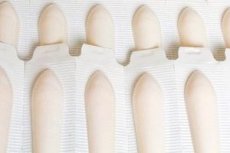
In the intestines of a healthy person, there is a certain balance between the microorganisms that inhabit it. The vast majority of bacteria (99%) are beneficial representatives of the intestinal microflora - these are bifidobacteria, bacteroids, lactobacilli, E. coli and enterococci. They promote complete digestion of food, the functioning of the immune system, supplying the body with vitamins, microelements, amino acids, proteins. Beneficial bacteria protect against the penetration of pathogenic microbes, slow down their growth and reproduction. Harmful bacteria (staphylococci, streptococci, proteus, clostridia, Pseudomonas aeruginosa) make up only 1% of the normal intestinal biocenosis.
Violation of the quantitative and qualitative balance of intestinal microflora, accompanied by a surge in the proliferation of pathogenic bacteria, is called dysbacteriosis. This provokes dysfunction of the gastrointestinal tract, which leads to diarrhea, constipation, flatulence, pain syndromes in the abdominal area, as well as anemia, vitamin deficiency, intoxication with the products of the vital activity of fungal flora.
In order to restore a balanced intestinal biocenosis and prevent its disruption, tablets for intestinal dysbacteriosis are used. These are probiotics - substances containing live beneficial bacteria that live in the intestines of a healthy person and prevent the growth and reproduction of pathogenic microorganisms.
Dosing and administration
 [ 7 ], [ 8 ], [ 9 ], [ 10 ], [ 11 ]
[ 7 ], [ 8 ], [ 9 ], [ 10 ], [ 11 ]
Bifidumbacterin
Probiotic that restores normal intestinal biocenosis. Active bifidobacteria bifidumbacterin restore the natural ratio of microorganisms in the intestine.
The use of the drug normalizes the functions of the gastrointestinal tract, stimulates the digestive process, the synthesis and absorption of vitamins and microelements, increases the immune barrier. This drug prevents the increase in the number of pathogenic microorganisms in the gastroduodenal zone.
It is used as a means of preventing intestinal biocenosis disorders in infants fed with infant formula or donor milk.
Packaging forms – vials, ampoules, packaged powders, capsules and suppositories. The packaging unit contains 5 doses of strains of live microorganisms.
Vials and ampoules contain strains of active bifidobacteria dehydrated by lyophilization in a culture medium, powders – purified from the substance in which they were cultivated. Dry bacteria quickly come to life when they enter a liquid nutrient substance.
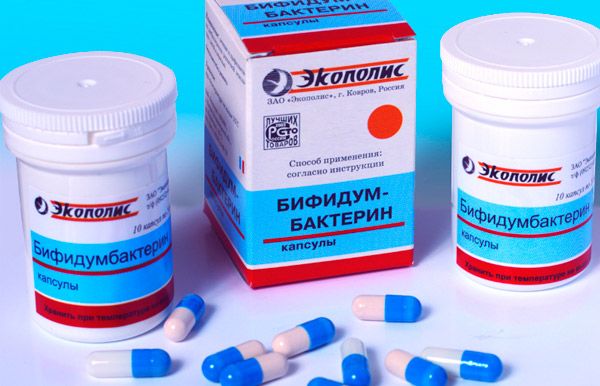
The capsules contain bifidumbacterin forte, the bacteria of which are immobilized with activated carbon from fruit pits. Once in the gastrointestinal tract, the immobile bacteria form colonies on the mucous membrane, which accelerates the restoration of intestinal microflora.
Bifidumbacterin forte is also supplied in packaged form.
Contraindications for use are decreased lactase activity in children and hypersensitivity to the components of this product. Cases of undesirable side reactions to the use of recommended doses of bifidumbacterin are not known.
Method of administration and dosage of bifidumbacterin:
For infants, the drug is diluted in formula or breast milk and consumed during feeding.
For patients over 1 year old, bifidumbacterin is mixed with a quarter glass of boiled drinking water or fermented milk drink, it is allowed to combine with liquid not hot food. It is necessary to take the mixture immediately, without waiting for dissolution. Use half an hour before meals, but if necessary - at any time.
Therapeutic dosages:
- Children from the first days of life up to 0.5 years - in the initial 2-3 days of treatment, one bottle 2-3 times a day, then the number of doses is increased to 4 or 6 times;
- Children 0.5–2 years old – one bottle 3-4 times a day;
- Children 3-7 years old – one bottle 3-5 times a day;
- Children over 7 years of age and adults can be prescribed two bottles 3-4 times a day.
The duration of treatment is from three weeks to one month, in acute forms of intestinal disorders - 5-7 days. After a month, the course of treatment can be repeated if necessary.
Preventive dosages:
- Children from the first days of life up to 0.5 years - one bottle once a day;
- Children 0.5–2 years old – one bottle 1–2 times a day;
- Children over 3 years old and adults – two bottles 1-2 times a day.
The duration of preventive therapy is from two to three weeks.
When used rectally, bifidumbacterin suppositories are administered three times a day, 1-2 pieces, in combination with oral administration.
The duration of therapy for chronic intestinal dysfunctions is 0.5-1 month, for acute ones – from 7 to 10 days.
There is no information on the consequences of overdose.
It can be used in combination with antibiotics, hormonal drugs, NSAIDs, and during chemotherapy.
The shelf life is no more than one year in a dry place, maintaining a temperature regime not exceeding 10°C (at room temperature - no more than 10 days).
 [ 12 ]
[ 12 ]
Lactobacterin
Probiotic. Forms an environment in the intestine that promotes the health of its microflora. This is a mass of active lactobacilli (lactobacillus plantarum or lactobacillus fermentum) dehydrated by the lyophilic method. They break down carbohydrates to create lactic acid, a strong antiseptic that prevents the increase in the number of pathogenic (dysentery, enteropathogenic bacilli, salmonella) and opportunistic microbes. Lactobacterin is functionally adapted for the body, because Lactobacilli are components of the biocenosis of a healthy intestine.
Contraindications for use and side effects are not known.
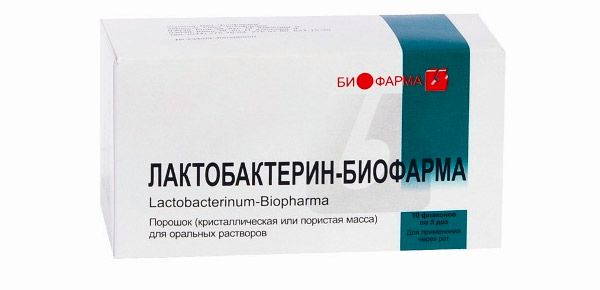
Lactobacterin is packaged in ampoules, capsules, and tablets containing lactobacilli lyophilisate not purified from the growth medium. Ampoules contain three (five) doses, and tablets and capsules contain one dose.
Swallow the dose of the drug whole one hour before meals, wash it down with milk if possible. It is advisable to combine treatment with lactobacterin with taking vitamins.
Recommended daily doses:
- Children from the first days of life up to 0.5 years – one or two doses;
- Children from 0.5 to 1 year – two or three doses;
- From 1 year to 3 years – three or four doses;
- More than 3 years – from four to ten doses;
- 8 years and older – six to ten doses.
The daily dose can be divided into 2-3 doses.
Duration of therapy:
- Long-term disruption of bowel function of various etiologies - from four to six weeks;
- Colitis and enterocolitis – from one and a half to two months;
- Dysbacteriosis of various etiologies – from three to four weeks.
Interaction with other drugs – does not interfere with taking antibiotics.
Store for one year at a temperature of no more than 10°C, in a dry, dark place.
Bificol
A probiotic whose action is similar to previous medications.
It is advisable not to use in cases of non-specific and specific colitis. Side effects - there is a possibility of mild digestive disorders.
It is produced in the form of a powder, crystalline or porous, packaged in vials of two, three and five doses, from which a suspension for oral administration is prepared. Lyophilisate of active bifidobacteria (bifidobacterium bifidum) and intestinal bacteria (escherichia coli).
Take orally half an hour before meals twice a day. Immediately before use, one dose of powder is diluted in 5 ml of boiled water at room temperature. Patients with increased acid formation should drink 10 minutes before taking the suspension ½ glass of mineral water "Essentuki No. 17", "Essentuki No. 14", "Borjomi" or a soda solution in the ratio - 5 g of soda per 200 ml of water.
Dosages of the remedy for intestinal dysbacteriosis Bificol:
- Children 0.5–1 year – one dose;
- Children 1–3 years old – two to five doses;
- Over 3 years old – three to five doses twice a day.
The duration of therapy corresponds to the clinical form and severity of the disease. The course of therapy for acute conditions is two weeks or more. In cases of prolonged intestinal dysfunction and post-dysenteric colitis - from 4 to 6 weeks. Treatment of chronic colitis, non-specific ulcerative colitis, enterocolitis lasts from one and a half to three months. The duration of the recovery period after chemotherapy is from three weeks to a month. If necessary, the course of therapy can be repeated no earlier than in two months. Maintenance therapy in the form of taking ½ of the age-related daily dose of the drug is carried out from one to one and a half months.
In cases of overdose, there is a possibility of minor digestive upset.
Not used simultaneously with antibiotics and during chemotherapy.
Store for one year at a temperature of no more than 10°C. Keep out of reach of children. The prepared suspension cannot be stored.
Bifiform
A probiotic whose active components are bifidobacteria and enterococci, which have a high level of resistance to the effects of antimicrobial agents. It is produced in capsules, the shell of which does not dissolve in gastric juice. When entering the intestine, the capsules dissolve, the active elements of bifiform colonize its sections and begin to synthesize acetic and lactic acid. This leads to the death of pathogenic microorganisms.
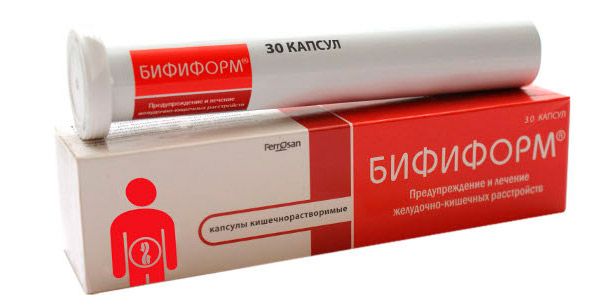
It is used similarly to the previous drugs, and also for diarrhea of unknown etiology, low lactase levels, and digestive disorders.
The drug is not prescribed in case of hypersensitivity to additional components of the drug (glucose, yeast extract, carob bean syrup, magnesium stearate, dry lactulose, titanium dioxide, polyethylene glycol, soybean oil, acetyl monoglycerides).
There are no known side effects from taking this medication.
Bifiform capsules for intestinal dysbacteriosis are taken orally.
In the morning and evening, regardless of food intake, swallow the capsules whole, washing down with a sufficient amount of water. Infants are given the drug in the first half of the day.
Dosage:
- Children from two to six months – ½ capsule;
- Children 0.5–2 years – 1 capsule;
- Over two years old – 1 capsule.
No more than four capsules can be taken per day. The duration of treatment is from ten days to three weeks, in case of gastroduodenal disorders accompanied by acute diarrhea - two or three days.
Prevention of traveler's diarrhea - one capsule twice daily.
Powder is produced for use from the first days of a child's life (its formula includes bifidobacteria and streptococci). An oil solution or suspension can be prepared from it. Oral administration is one dose per day. Duration of therapy is from 10 to 20 days.
There are no known cases of overdose.
Can be combined with other medications, including antibiotics.
Bifiform and Bifiform Baby should be stored for two years in a dry place protected from light, maintaining a temperature of no more than 15°C. The prepared suspension Bifiform Baby should be stored for two weeks.
 [ 13 ]
[ 13 ]
Linex
A probiotic whose active components are strains of lactobacillus acidophillus, bifidobacterium infantis, streptococcus faecium. It is used to improve and stabilize the intestinal biocenosis.
Contraindications for use: hypersensitivity to additional components of Linex and dairy products.
There are no known side effects from taking this medication.

Linex capsules are taken orally three times a day with food, taking into account that it cannot be consumed with hot drinks.
Dosages:
- From birth to two years – one capsule;
- From two to 12 years old – one or two capsules;
- Over 12 years old – two capsules.
If you cannot swallow the capsule whole, mix its contents with one teaspoon of liquid. Use the mixture immediately.
The duration of treatment is related to the cause and severity of the disease; usually, Linex capsules are used until a satisfactory effect is achieved. If diarrhea does not stop within two days, is accompanied by fever, traces of blood or mucus in the stool, acute abdominal pain, you must urgently consult a doctor. With diarrhea, you need to restore the fluid-electrolyte balance.
There is no data on overdose.
It is allowed to use with chemotherapy drugs and antimicrobial drugs. To enhance the effectiveness of Linex, it is advisable to take it three hours after chemotherapy or taking antibacterial drugs.
No significant interactions of this drug with other drugs have been identified. Incompatible with alcohol.
Store for one year at a temperature of no more than 25°C in a dry place.
Enterol
Enterol has antidiarrheal, antiparasitic, antifungal and intestinal microflora-improving effects. The active substance of the drug is a lyophilisate of yeast bacteria saccharomyces boulardii - antagonists of clostridia, klebsiella, pseudomonas aeruginosa, salmonella, shigella, yersinia, Staphylococcus aureus, Candida fungi, cholera vibrio, entero- and rotaviruses, as well as lamblia and dysenteric amoebas. Protects intestinal microflora, inhibiting the development of colonies of pathogenic microbes and fungi and maintaining the natural superiority of beneficial microorganisms.
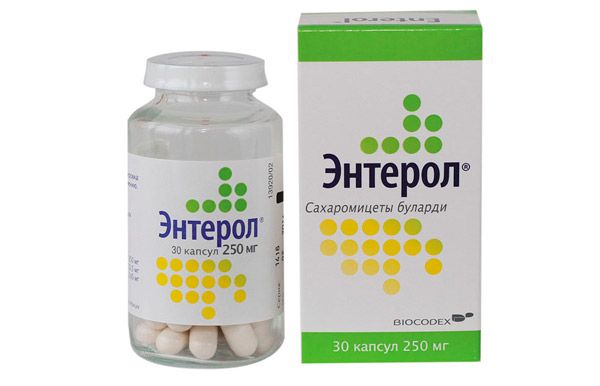
Neutralizes enterotoxins, especially effective against intoxication by the waste products of clostridia.
Promotes the production of immunoglobulins, in particular iga, which destroys pathogenic bacteria in the intestinal sections before they are absorbed into the blood. Increases the local immune barrier of the mucous membranes of the small and large intestines. Activates the processes of cellular nutrition of the intestine. Promotes the breakdown of carbohydrates by stimulating the activity of enzymes in the small intestine.
Available in capsules and packaged powder. Each package contains 250 mg of active ingredient.
There are no official data on the study of the use of enterol during pregnancy and lactation.
There are no contraindications to the use of recommended doses of the drug.
Side effects in the form of minor allergic reactions and discomfort in the epigastric region, which do not lead to discontinuation of the drug.
Taken orally after meals, 250-500 mg once or twice a day. Swallow capsules whole with water at room temperature. Pour powder into a glass of water, stir and drink.
There is no data on overdose.
Concomitant use with antibiotics is possible. Taking it together with other oral antifungal agents reduces the effect of Enterol.
Store for three years at a temperature of no more than 25°C.
 [ 14 ], [ 15 ], [ 16 ], [ 17 ], [ 18 ], [ 19 ]
[ 14 ], [ 15 ], [ 16 ], [ 17 ], [ 18 ], [ 19 ]
Bactisubtil
Probiotic with the active component - lyophilisate of bacterial spores bacillus cereus ip 5832. Has antimicrobial and antidiarrheal effectiveness. Counteracts the growth and reproduction of pathogenic microorganisms in the intestine, restores the natural balance of its biocenosis.
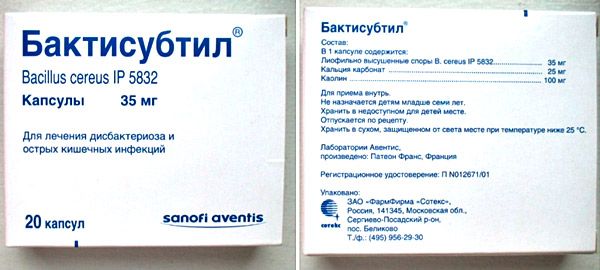
Gastric juice does not destroy the shell of the spores of Bacillus cereus ip 5832. The process of activation with subsequent germination into vegetative cells occurs in the intestine.
Available in capsules.
There are no official data on the study of the use of bactisubtil during pregnancy and lactation.
Not prescribed for primary immunodeficiencies, hypersensitivity to the capsule components.
There is no information about any adverse side effects from taking the drug.
It is taken orally one hour before meals in the following dosages:
- Children over three years old - three to six capsules per day;
- Over 14 years old - from four to eight per day.
The duration of treatment is from seven to ten days.
If swallowing is not possible, the capsule contents can be mixed with liquid at room temperature.
Store for three years in a dry, dark place, maintaining a temperature of no more than 25°C. Keep out of reach of children.
 [ 20 ]
[ 20 ]
Bactisporin
Probiotic with an active component - lyophilisate of live bacterial strains bacillus subtilis 3n. Has a broad spectrum of antimicrobial activity. Inhibits the growth and reproduction of pathogenic microorganisms in the intestinal lumen.
When bacteria enter the gastrointestinal tract, they secrete enzymes that accelerate and normalize the processes of digestion and assimilation of food, free the gastroduodenal zone from microorganisms that are not typical for it, stabilizing the intestinal ecological system.
It is produced in the form of powder, packaged in ampoules. The contents of one ampoule correspond to one dose of the drug.
There are no contraindications for use. Possible side effects as a result of taking baktisporin are increased body temperature, skin rashes. If there is a history of drug allergy, it is prescribed with caution.
Directions for use: open the ampoule, dissolve its contents in 10 ml of cool boiled water. Take orally twice a day 30–40 minutes before meals (for infants – immediately before feeding).
Therapeutic dosage for children from 1 month to 1 year is half the contents of the ampoule; over 1 year - one ampoule.
The duration of therapy for acute intestinal infections is from five to seven days; for dysbacteriosis and allergic dermatosis - from ten days to two weeks.
Therapeutic dosages for adults for acute intestinal infections are one or two ampoules for 5–7 days; for dysbacteriosis and allergic dermatosis, one ampoule for ten days to three weeks.
There is no data on overdose and interaction with other drugs. Can be used with any drugs.
Store for three years in a dry place, maintaining a temperature of 2–8°C.
Acipol
A probiotic that combines active acidophilic lactobacilli of strains nk1, nk2, nk5, nk12, dehydrated by the lyophilic method, and polysaccharides of kefir fungi killed by high temperatures. Acipol suppresses the action of pathogens of the gastrointestinal tract, resists the formation of putrefactive processes in the intestine. This occurs by creating conditions that are not suitable for the development of pathogenic microorganisms.
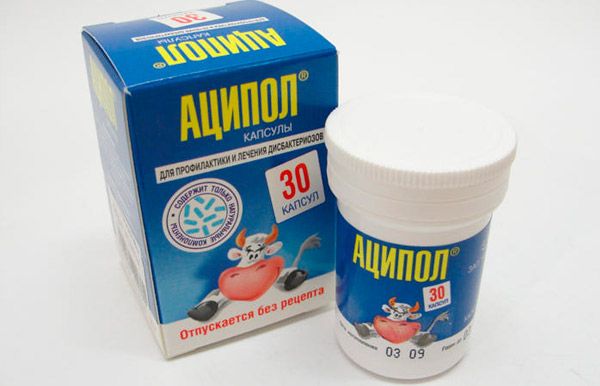
Lactobacilli support the production of fatty acids in the intestinal sections, which leads to an increase in the acidity of its environment. An acidic environment promotes the regression of pathogenic bacteria and fungi, improves the motor activity of the gastrointestinal tract (eliminates food stagnation) and accelerates the process of removing ammonia, which promotes detoxification of the body.
Acipol stimulates the production of B vitamins, vitamin K, and other natural biologically functional substances, the absorption of nutrients, normalizes cholesterol and bilirubin metabolism, and improves immunity.
It is not prescribed if the patient has a history of hypersensitivity to the components of Acipol. Side effects are unknown.
It is available in capsules. It is advisable to swallow them whole with a sufficient amount of water. For children under 1 year old - dissolve the contents of the capsule in a small amount of water or milk.
Therapeutic dosages:
- Children from 3 months to 3 years – one capsule two or three times daily during meals;
- Children over 3 years of age and adults – one capsule three or four times daily 30 minutes before meals.
Preventive dosage: one capsule daily for ten to 15 days.
The duration of therapy for intestinal infections with Acipol is at least eight to ten days. The course of therapy can be repeated after a month if necessary.
There is no information about the negative consequences of exceeding the recommended doses of Acipol and its interaction with various drugs. It can be combined with any medications.
Store for two years at a temperature of 2–10°C.
Bifiliz
A probiotic whose active ingredients are lyophilisate of live bifidobacteria (bifidobacterium bifidum), lysozyme (an enzyme of the hydrolase class), has antimicrobial properties and affects the normalization of the ratio of beneficial and pathogenic components of the intestinal microbiocenosis. The drug acts similarly to those described above.
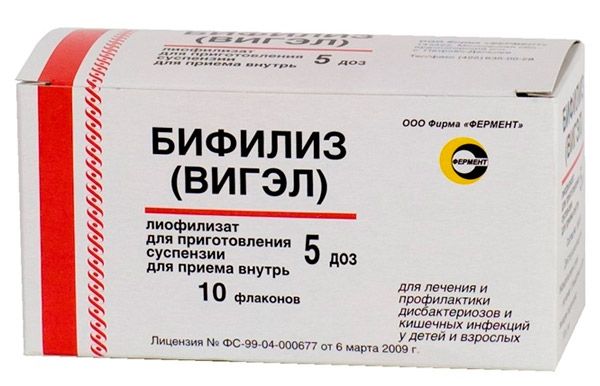
Adding lysozyme to bifidobacteria enhances the antimicrobial effect of the preparation due to its ability to destroy bacterial cell walls. Lysozyme has anti-inflammatory and metabolic effects, normalizes the level of red blood cells, and activates the growth and reproduction of bifidobacteria.
Bifiliz promotes radical healing of intestinal diseases, preventing them from becoming chronic.
Not prescribed to patients with hypersensitivity to egg protein.
There are no known side effects of use.
It is produced in the form of powder packaged in vials and rectal suppositories. One packaging unit contains five doses of the medicinal substance.
Directions for use:
Open the bottle, fill the contents with water at room temperature, close the lid and shake. The solution is taken orally half an hour before meals. In pediatric practice, it can be taken with food or immediately before meals. Usually, a daily dose of two or three bottles is prescribed.
Acute forms of intestinal dysfunctions are treated from five to ten days. Longer treatment up to 20 days is also possible.
The dosage for the prevention of dysbacteriosis is two bottles daily for ten days. Children under 3 months can be prescribed half of the bottle contents at a time. The course of treatment can be repeated after a break of 8–12 weeks.
Rectal suppositories are removed from the shell before use. The patient's intestines are cleansed.
Therapy for intestinal infections involves the use of three to six rectal suppositories daily. For acute intestinal infections, the course of treatment lasts from a week to ten days. For chronic diseases, as well as dysbiosis, the duration of treatment is from ten days to two weeks.
Longer courses are also possible.
When using rectal and oral forms together, two to three suppositories and two to three bottles daily. Duration of treatment is from two to three weeks.
For children – two to three suppositories daily for a week.
There is no data on overdose.
Interaction with other drugs has not been identified. Combined use with antibiotics, sulfonamides, antiviral drugs, and immunomodulators is possible.
Store for one year at a temperature of 2–10°C.
Bifido tank
It is not a medicinal product. The active substance is a lyophilisate of bifidobacterium adolescentis. It has the ability to maintain the normal balance of intestinal microflora.
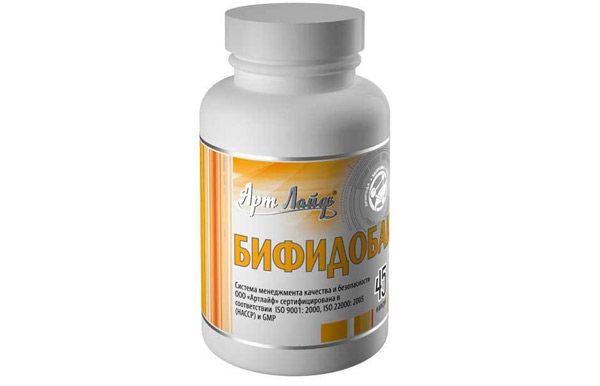
The high-tech production process of making capsules guarantees excellent assimilation of bacteria in the intestine. The biopolymer shell of the capsule protects the contents from the aggressive gastric environment, breaking down in the intestinal sections. The basis of the microcapsule is fructooligosaccharides. This is a natural nutrient substance for bifidobacteria. Its presence during the activation of bacteria in the intestine ensures their activity, accelerates reproduction and significantly increases the effectiveness of the correction of the state of the intestinal microbiocenosis.
Available in 0.6g capsules.
Not used in case of individual intolerance to the components of the dietary supplement.
Directions for use and dosage: Adults take one capsule two to three times daily with meals.
There are no known cases of overdose.
Store for one year at a temperature of 2–4°C.
 [ 23 ]
[ 23 ]
Laminolact
It is not a medicine. The active component is enterococcus faecium l-3 bacteria, active representatives of the normal microbiocenosis of the human intestine. Additional components of laminolact are natural substances of plant origin. It is used to improve intestinal microflora and prevent dysbiosis. Increases the immune barrier, stimulates the processes of digestion and assimilation of food. For effective immunomodulation, bilaminolact was created - a version of a bioactive supplement that includes bifidobacteria bifidum adolescentis.
During pregnancy and lactation, it is recommended to use Laminolact Eva, which ensures that the mother and child do not have problems with digestion and the stability of the immune system.
Contraindicated in case of hypersensitivity to some components of the dietary supplement.
There are no known adverse reactions to laminolact.
Release form - dragee. 14 variants of the drug composition are produced, from which you can choose a variety that does not include intolerable ingredients.
Directions for use and dosage:
The minimum dosage for adults to achieve a sustainable effect of stabilizing health is to take nine to ten pieces daily, two to three times a day, regardless of meals.
In cases of acute conditions or consequences of long-term antibiotic therapy, it is advisable to take 30 tablets per day for two or three days, then as usual (daily dose 9-10 tablets per day).
Minimum dosage for children - the number of pills taken corresponds to the child's age in years. For example, the minimum daily dose for a four-year-old child is four pills.
The maximum dosage for both adults and children has no restrictions. Therefore, there can be no overdose.
Can be used in combination with other medications.
Store for one year, maximum effectiveness of bacteria is maintained for six months after the preparation is made.
Intetrix
Antidiarrheal combination drug, antagonist of pathogenic bacilli, fungi, amoebas, which actively multiply when the balance in the intestinal microbiocenosis is disturbed.
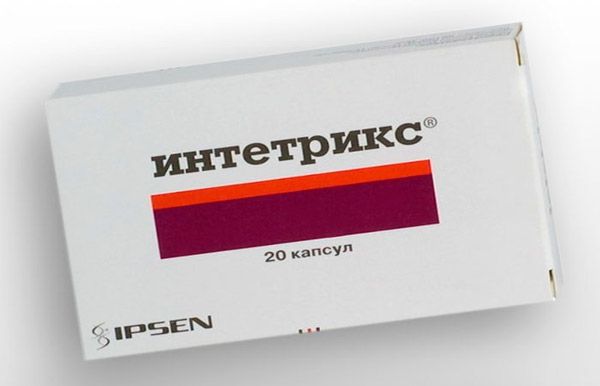
It is prescribed for dysbacteriosis and diarrhea caused by intestinal infections, amoebic dysentery and amoebic carriage without the development of the disease, as a means of preventing gastrointestinal infections, dysbiosis and diarrhea.
Intetrix is not prescribed during pregnancy and lactation.
Contraindications for use - intolerance. In case of liver and/or kidney dysfunction, use with caution. Duration of use is no more than a month.
Side effects include pain in the stomach area and nausea.
Available in capsules.
Take orally before meals with half a glass of water. The daily dose is three or four.
Therapeutic dosages:
- Severe acute gastrointestinal infections – daily dosage from six to eight capsules;
- Acute gastrointestinal infections of moderate severity – daily dosage from four to six capsules (duration of therapy from three to five days);
- Chronic amebiasis – daily dosage of four capsules (duration of treatment is 10 days, repeat course of therapy – after a month);
- Fungal diarrhea - daily dose three capsules.
Preventive dosages:
- Traveller's diarrhoea, unfavourable endemic conditions - daily dose two capsules (duration of administration - until the risk of infection has passed, but not more than a month);
- Antibacterial therapy – daily dose three capsules.
If swallowing is not possible, the contents of the capsule can be mixed with one teaspoon of water or food.
Interactions with other drugs - do not use in combination with hydroxyquinolines. To prevent unwanted interactions with other drugs, take them separately with a break of at least two hours.
Cases of overdose are unknown; in cases of high doses of the drug, it is recommended to monitor the level of liver transaminases and prothrombin.
Store for two years at temperatures up to 25ºС.
Nifuroxazide
Antidiarrheal drug with the active substance of the same name. Destroys almost all pathogens of intestinal infections (salmonellosis, dysentery, yersiniosis, cholera, acute gastritis, etc.) and inflammatory processes (bacteremia, pneumonia, septicopyemia, acute pyelonephritis, prostatitis, nosocomial angioinfections). Not used against pseudomonads and individual strains of Proteus.
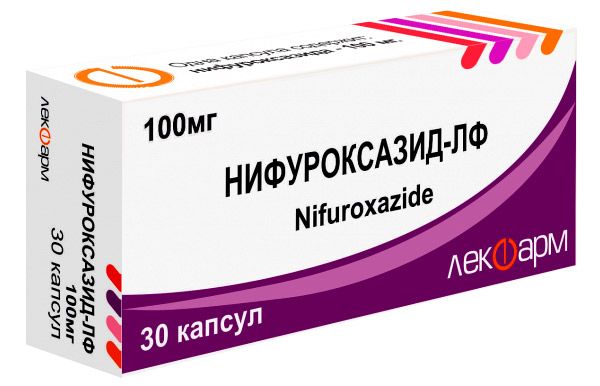
The dosage size affects the action of nifuroxazide – whether it destroys pathogenic microorganisms or only prevents their reproduction. Presumably, the drug inactivates dehydrogenases, thereby disrupting the process of protein biosynthesis in the cells of pathogenic bacteria.
Medium doses do not inhibit the growth and reproduction of beneficial representatives of the intestinal microbiocenosis and do not contribute to the emergence of drug-resistant strains of pathogenic bacteria.
In cases of viral intestinal disease, it has a preventive effect against the addition of a secondary bacterial infection.
This drug is not absorbed in the stomach, accumulating in the intestine, where its metabolism process occurs. It is excreted slowly, remaining in the gastrointestinal tract for a long time. It is excreted by the intestine.
Use by pregnant and lactating women only for medical reasons under the supervision of a physician.
Contraindicated in case of intolerance to nitrofuran derivatives and/or any additional components of the drug.
Nifuroxazide is well tolerated, but occasionally side effects are possible in the form of digestive disorders and short-term exacerbation of diarrhea, which does not require either treatment or discontinuation of nifuroxazide. In case of allergy, the drug should be discontinued.
Available in tablet form and suspension for oral administration.
The suspension is intended for children under seven years of age. Shake the bottle with the suspension several times before use. The package contains a double measuring spoon. The smaller spoon holds 2.5 ml or 110 mg of the drug, the larger one - 5 ml or 220 mg.
Dosage for taking the suspension:
- Children from 1 month to six months – 2.5 ml two to three times a day;
- From six months to two years – 2.5 ml four times a day;
- From two to seven years old – 5 ml three times a day;
- Children over seven years of age and adults – 5 ml four times a day.
The tablet form of nifuroxazide is intended for children from seven years of age and adults. Take two tablets orally every 6 hours, regardless of food intake. The duration of treatment is from 5 days to a week.
In the process of treating acute diarrhea, continuous compensation of fluid deficiency is necessary (depending on the patient’s condition – oral or intravenous).
The consequences of overdose are not described. In case of exceeding the recommended dose of the drug, perform gastric lavage.
Interaction with systemic drugs is impossible, since only traces are detected in the blood. When used in combination with other drugs, its high adsorption capacity should be taken into account.
Store in a dry, dark place, maintaining a temperature of 17-25ºС.
Most of the above-described drugs are probiotics (eubiotics). These are modern products (medicines and biologically active supplements) containing live microorganisms of the normal human intestinal environment. Probiotics restore intestinal microbiocenosis in a natural way, they are physiological for the body, and have virtually no contraindications or side effects.
However, it should be taken into account that the dosage of even such, at first glance, safe drugs and the duration of the course of treatment are determined only by the attending physician individually for each patient.
Use for intestinal dysbiosis pills. during pregnancy
Since tablets that restore normal symbiosis of intestinal microorganisms contain natural beneficial components of its microflora, their use by pregnant and lactating women is considered safe. However, it is recommended to use these drugs only as prescribed by a doctor.
Attention!
To simplify the perception of information, this instruction for use of the drug "Tablets and capsules for intestinal dysbiosis" translated and presented in a special form on the basis of the official instructions for medical use of the drug. Before use read the annotation that came directly to medicines.
Description provided for informational purposes and is not a guide to self-healing. The need for this drug, the purpose of the treatment regimen, methods and dose of the drug is determined solely by the attending physician. Self-medication is dangerous for your health.

